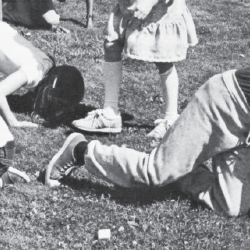Source Institutions
Source Institutions
Add to list Go to activity
Activity link broken? See if it's at the internet archive

In this outdoor, sensory activity, learners role play as animals trying to identify their "family's" scent and locate their "territory." Learners mark their territories and sniff out other territories marked with flavors and smells like peppermint, vanilla and onion. Learners also explore how humans set up and mark territories, and what role scent plays in the learners' real lives. This activity can be made simpler for younger learners.
- 1 to 2 hours
- 45 to 60 minutes
- $10 - $20 per group of students
- Ages 8 - 14
- Activity, Game, Lesson/Lesson Plan, Simulation
- English
Quick Guide
Materials List (per group of students)
- small sticks or nails
- colored construction paper, contact paper or yarn (four colors)
- masking tape
- scissors
- kitchen sponges
- small bottles of 4 flavor extracts
- plastic bags (bread loaf size)
- plastic zip-lock bags (sandwich size)
- paper bags
- 2 large flags
- 4 plastic vials (7-dram size)
- 1 liter of water
- 1 ball of string (at least 150 meters long) (optional)
- paper towels (optional)
Subjects
-
Life Sciences
-
Diversity of Life
- Animals
-
Ecology
- Ecosystems
-
Evolution
- Evidence for Evolution
-
Human Senses and Perception
- Smell
-
Diversity of Life
-
The Nature of Science
-
The Scientific Process
- About Inquiry
- Asking Questions
- Conducting Investigations
- Formulating Explanations
- Communicating Results
-
The Scientific Process
Informal Categories
- Animals
- Games
- Nature and Environment
- Outdoor Activity
- Physical Activity
Audience
To use this activity, learners need to:
- see
- see color
- be mobile
- smell
- touch
Learning styles supported:
- Involves teamwork and communication skills
- Involves hands-on or lab activities
Other
This resource is part of:
Access Rights:
- Free access
By:
Rights:
- All rights reserved, The Regents of the University of California, 1980
